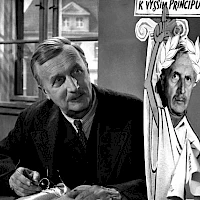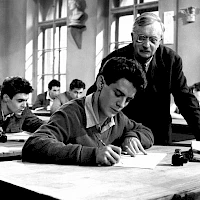 June 1942: Reich Protector Heydrich, the "Butcher of Prague", dies in an assassination attempt and Nazi terror breaks out in the Protectorate of Bohemia and Moravia. People are executed by the dozen. Meanwhile, the pupils of a small-town grammar school are about to take their final exams.
June 1942: Reich Protector Heydrich, the "Butcher of Prague", dies in an assassination attempt and Nazi terror breaks out in the Protectorate of Bohemia and Moravia. People are executed by the dozen. Meanwhile, the pupils of a small-town grammar school are about to take their final exams.
The son of a well-known collaborator in the town is not allowed to take his final exams because of his poor grades. In revenge, he denounces three of his classmates to the Gestapo, who are subsequently arrested. One of their teachers, who actually prefers to live in the world of the classics rather than deal with the here and now, is shocked by this and bravely tries to save the three of them.
In a way, the 1960 film is an example of the transition from the largely propagandistic filmmaking of the 1950s to the greater freedom of the 1960s, which led to the Czechoslovak New Wave, among other things. The characters are much more differentiated, whereas previously woodcut-like characters predominated. The difficult period of the German occupation is also shown in more facets. Although the depressed atmosphere is very easy to empathize with, it is not portrayed exclusively as hell on earth, but also contains beautiful moments.
These are probably important reasons why the film is not only still the most popular Czech film of the time, but one of the most popular Czech films ever. The important portal csfd.cz ranks it second behind Pelišky.
This film will be shown as part of the "Czech Film Wednesday" series, as always in the original version with German subtitles.
If you would like to be reminded in good time about Film Wednesday and receive further information about Czech culture in the Elbe/Labe Euroregion, you can subscribe to our cultural newsletter.




